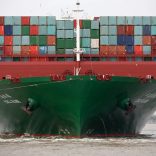Solenta Aviation says delay in issuing license for domestic flights in Mozambique "is not normal"
Mozambique: INAE seized 220 tonnes of cement this month

File photo: O País
Mozambique’s National Inspectorate of Economic Activities (INAE) seized about 220 tonnes of cement in January, after a nationwide inspection drive intended to discourage price speculation, largely carried out by informal retailers.
Addressing a joint press conference on Friday in Maputo to clarify the alleged price speculation of cement and several moves taken to halt the wave of speculation, the INAE General Inspector Rita Freitas said between 13 and 21 of January, 250 warehouses and retail establishments were inspected and about 220 tonnes seized.
The seizures arose from various irregularities that were found, such as illegal sale (without a license), and poor conditions for storing and selling the product. Some of the informal retailers sell the cement on the pavement, exposed to the elements.
The inspection was triggered by recent claims on social media that a 50 Kilo sack of cement allegedly costs 720 meticais (about 10 US dollars at the current exchange rate) somewhere on the streets of Maputo. However, after the inspection campaign, the INAE team concluded that in reality sacks of cement are sold for between 410 and 500 meticais, and the most desired varieties for between 470 and 530 meticais.
“It is the government’s duty to ensure that the product has the right quality,” Freitas said. She added that INAE monitors the price of 12 basic food products, as well as that of cement. “After thorough verification, we have not found anywhere where the price charged is 720 meticais,” she said.
The National Director of Industry, Sidonio dos Santos, said there are 14 cement manufacturers across the country and the total installed capacity has reached 5.7 million tonnes a year. Last year, despite the Covid-19 pandemic, the cement factories worked successfully and recorded a 2.1 per cent growth when compared to 2019.
But some of the factories, dos Santos said, have been faced with breakdowns and difficulties in access to raw materials especially clinker which mostly has to be imported from South Africa.
“Despite reasonable domestic production of clinker by one of the manufacturers, the other industries have to import and the restrictions caused by the Covid-19 pandemic had an impact on the production levels,” dos Santos said. “The depreciation of the metical also has a bad impact on imports.”
The chairperson of the Association of Cement Manufacturers, Edney Viera, pointed to factors which should not be underestimated when looking at the pricing of cement.
These include the cost of electricity which rose by 17 per cent in 2020. Furthermore cement sacks are not produced in Mozambique, and have to be imported, sometimes with delays in delivery.
Sidonio dos Santos said efforts are underway to attract investors interested in making the cement packaging inside Mozambique.













Leave a Reply
Be the First to Comment!
You must be logged in to post a comment.
You must be logged in to post a comment.